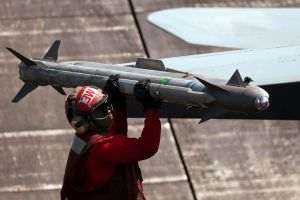The US has not abandoned any military equipment in the hands of the Taliban during the withdrawal of US military forces from Afghanistan in the summer of 2021, said Reserve Admiral John Kirby, national security and communications adviser to President Joe Biden, at a press conference yesterday which he held at the White House, Washington, after congressional Republicans released a report on that withdrawal. According to the data in the report, following the withdrawal, the Americans abandoned in Afghanistan almost 57 million dollars in cash, as well as weapons and military equipment worth about 7 billion dollars.
Jon Kirby stated: "There was no handing over of American equipment to the Taliban. That equipment was supplied to Afghan security forces, with the approval of Congress, during two decades of war. That equipment came into the possession of the Taliban when Afghan security forces surrendered or hostilities ceased. (...) First of all, on the very day this administration took office, the Taliban were at their strongest position in years and the Afghan government was at its weakest in a decade. The Trump administration had previously brokered a deal called the Doha Accord to the Biden administration that mandated a full US withdrawal from Afghanistan by the end of May 2021, which included Bagram Air Base. Following the agreement concluded by Donald Trump, 5000 Taliban fighters were released from prisons in Afghanistan. In return, the Taliban agreed not to attack American troops as Donald Trump decided to reduce our military presence in Afghanistan from about 14,000 troops to 2,500."
The US official said the withdrawal ordered by Trump had "a really pernicious effect" on the Afghan government and military, leading to the demoralization of Afghanistan's authorities and the loss of political power.
Regarding the withdrawals mentioned in the Republican congressmen's report, Admiral Kirby indicated that planning for withdrawals from Afghanistan began in the spring of 2021 and was done by all US defense agencies.
Jon Kirby said: "In fact, the Department of Defense pre-positioned military units in the region so that once the decision to evacuate was made, they would be ready to respond in a timely manner. Second, there was no fine-tuning of how quickly things would unfold in August 2021. Everything unfolded much faster than any anticipation. As the Taliban advanced, Afghan security forces ceased fighting and members of the Ghani government fled the country. As the chairman of the Joint Chiefs of Staff at the time, General Mark Milley, said, "nothing we saw indicated a collapse of this military and this government in just 11 days." There was no point in securing Bagram Air Base for use during the evacuation. Doing so would not only have required the additional presence of thousands of US troops, but would have involved a dangerous journey for evacuees into Taliban-held territory, making the evacuation even more difficult to execute than it already was."
According to the American official, in the military operations in Afghanistan carried out under the umbrella of NATO, 2,461 US soldiers lost their lives, and 125,000 people were evacuated when the troops withdrew. According to Sharon Yang, one of the spokespersons of the US Presidential Administration, during the 20 years that US troops were present in Afghanistan (2001-2021), the US spent over 2 trillion dollars on operations there.
We note that two days ago the Foreign Affairs Committee of the House of Representatives, which is chaired by Republican Michael McCaul, accused Biden of ignoring the warnings of his staff and allies, which led to the neglect of American interests in Afghanistan, at the time of taking over power by the Taliban in the summer of 2021. The report states: "The evidence demonstrates that President Biden's decision to withdraw all US troops was not based on the security situation, the Doha Agreement, or the advice of his national security advisers or our allies. Rather, it was based on his long-held opinion and adamant that the United States should no longer be in Afghanistan."
During the hearings, the House Foreign Affairs Committee heard testimony from top US administration officials, including the former chief of mission of the US Embassy in Afghanistan, Ross Wilson, and the US's chief negotiator with the Taliban, Ambassador Zalmay Khalilzad. Committee members also questioned former State Department spokesman Ned Price and former White House press secretary Jen Psaki, who they said were complicit in misrepresenting the seriousness of the withdrawal from Afghanistan.

























































